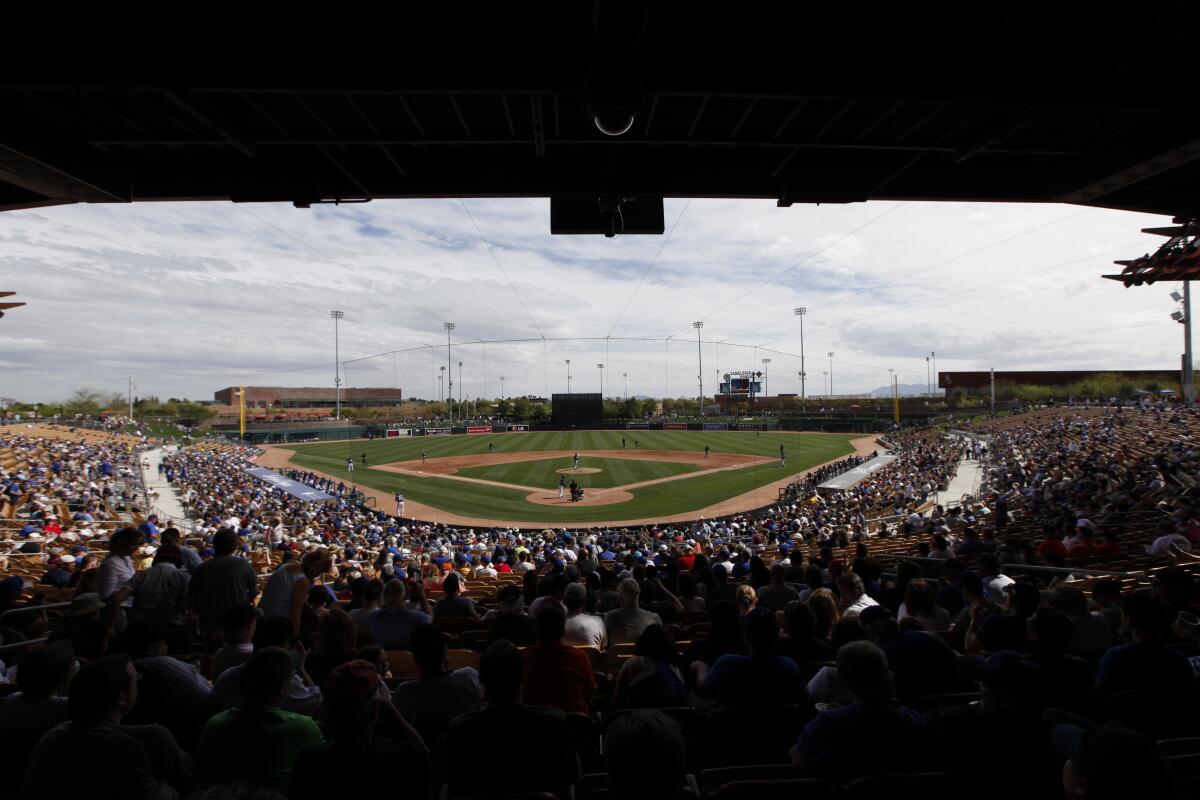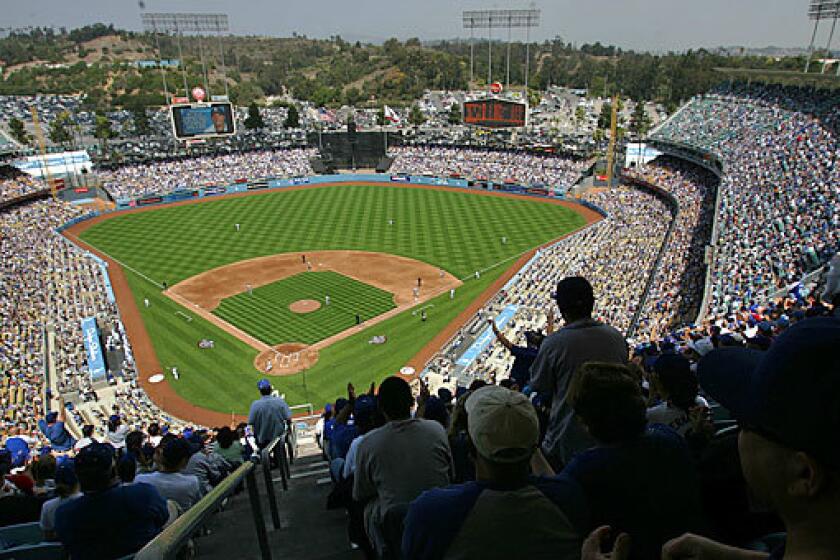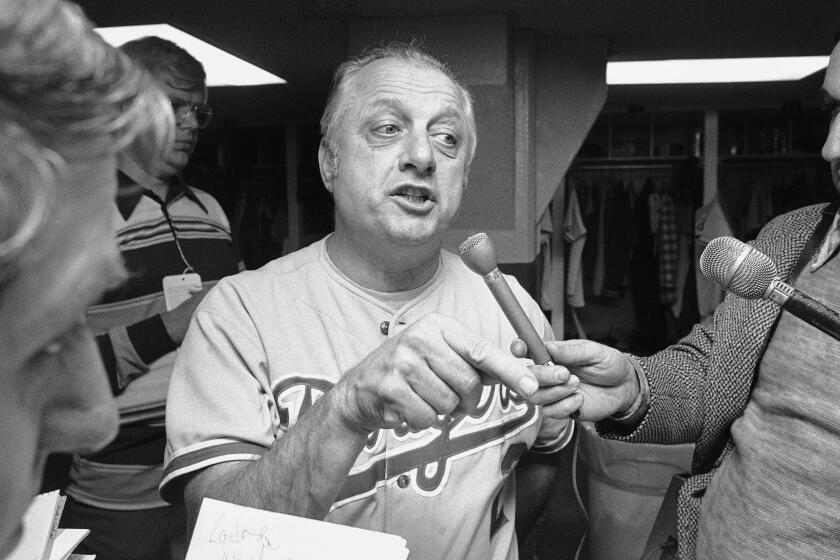Some Arizona officials hope MLB delays start of spring training by a month

For baseball fans in Southern California, nothing says spring quite like a trip to the Cactus League. Hop in the car, or on a short flight to Phoenix, and sun-drenched baseball can be yours before the Dodgers and Angels return home for the new season.
In the Cactus League, tourists are the target audience. The stadiums almost always are built at no cost to the teams, with public agencies counting on tourist dollars to provide the return on investment. Glendale, Ariz., borrowed $200 million to construct Camelback Ranch, luring the Dodgers and Chicago White Sox to that Phoenix suburb.
“It’s really the fans that built the business case for why you would want to spend $200 million on a spring training complex,” Glendale city manager Kevin Phelps said. “Without those fans staying in your hotel rooms and eating in your restaurants and shopping in your stores, spring training quickly becomes one of the worst business decisions you can make.”
That is why some Arizona officials are hoping Major League Baseball delays the start of spring training. By waiting another month, as holiday-related coronavirus surges subside and vaccinations become more readily available, Cactus League games could be regarded as a safer and more attractive draw for tourists.
“In the current climate, right now, I think anyone would like to be able to put it off,” Cactus League executive director Bridget Binsbacher said. “But, to be clear, it’s definitely not a decision that the Cactus League makes.”
MLB does not plan to mandate that fans provide proof of vaccination or a negative COVID-19 test result before entering a ballpark this season.
An MLB spokesman said Tuesday the league has not heard directly from Cactus League representatives.
The commissioner’s office and the players’ union have discussed postponing the regular season for a month, according to people familiar with the discussions. The two sides so far have been unable to reach agreement because the union asked the league to guarantee the contractually required 162 games of pay,either by paying players for games lost to a shortened season or by extending the season into October and the postseason into November. The league indicated its television partners prefer the postseason completed in October.
The first Cactus League games are scheduled Feb. 27. As of now, fans of the five California teams would be discouraged from attending, under state coronavirus guidance that urges California residents not to travel more than 120 miles from home — and, should they travel, to quarantine for 10 days upon their return.
“It’s even worse than Southern California here right now,” said Will Humble, executive director of the nonprofit Arizona Public Health Assn.
The COVID-19 case rate for the last week is higher in Arizona than for any other state except Rhode Island, according to the national Centers for Disease Control and Prevention.
Humble, the former director of the state health department, said a one-month delay would allow for greater vaccination of the senior citizens that serve as volunteers and staffers at Cactus League games — and enjoy attending them as well.
“While you will not be able to have vaccinated all of your fans,” Humble said, “you will have had an opportunity to vaccinate all of your high-risk fans.”
In California, fans are not allowed at professional sporting events. In Arizona, “public events” of more than 50 people are prohibited statewide, but local officials can approve such events with “adequate safety precautions … for mitigating the spread of COVID-19.”
In Glendale, the NHL Arizona Coyotes are set to admit 3,450 fans — 25% of arena capacity — when the hockey season starts Thursday. The Coyotes are one of three NHL teams set to allow fans into their arena.
MLB has invited teams to submit attendance plans for spring training stadiums. Phelps, who approved the Coyotes’ plan, said he would feel comfortable allowing 25% of capacity at Camelback Ranch — about 3,250 fans — with such safety protocols as mask wearing, hand sanitizer stations and temperature checks.
“What we can focus on is what we can have control over, and that is creating a safe environment, if we are in a situation to welcome fans back into our facilities,” Binsbacher said. “We need to make sure we have public health at the forefront of everything we do.
“If we could safely have even limited fans, that’s still a huge opportunity for Arizona.”
Out-of-state Cactus League visitors spent an average of $336 per day last year and stayed a median of four days, according to an Arizona State University study. Even in the pandemic-shortened spring, the study estimated that out-of-state visitors spent a total of $168 million during their Cactus League trips.
A later start to spring training could mean more out-of-state fans could attend, and spend.
“I would be surprised if there wasn’t broad support from all the facilities to push it back a month,” Phelps said. “I think everybody does agree, as we get more and more people vaccinated and we get through the holiday surge, that it would be easier to manage this in April rather than in March.”
The Angels train in Tempe. The city manager there, Andrew Ching, said he is not sure a delay would ensure more fans and more revenue, in part because he is uncertain how many of the traditional spring break and spring vacation trips would be pushed back to April.
“The heart of the issue is trying to recoup the investment,” Ching said. “That’s certainly a consideration we could look at. But my No. 1 consideration would be what we could do to make sure our visitors and our residents and the people on the field and our city workers are being kept as safe as possible. That’s my No. 1 priority, whether it happens at the end of February or at the end of March.
“A decision to delay spring training a month also delays the opening of the season a month. That potentially affects the number of games to be played, which has revenue impacts on the franchises and Major League Baseball. There’s a lot of dominoes that get set in motion if that decision is made. It’s hard to figure out, off the top of my head, where the balance of equities would lie in that situation.”
Tommy Lasorda, who died last week at age 93, masterfully motivated players through emotional outbursts, hilarious antics and relentlessly positive bromides.
Indeed, while the Arizona State study estimates the pandemic-shortened spring cost the state $281 million in economic impact last year, that loss pales in comparison to the $3 billion that Commissioner Rob Manfred says MLB owners lost. MLB players lost 63% of their salaries.
Phelps suggested whatever help MLB could provide to the Cactus League now could pay off later.
For instance, the Angels’ lease in Tempe expires in 2025. Diablo Stadium is the most picturesque ballpark in the Cactus League, but the concourses can be uncomfortably crowded, and the Angels have so outgrown the cramped facility that they have to put up tents so players can have additional workout and dining space.
And, 12 years after Camelback Ranch opened, Glendale still owes $182 million on the facility, city spokesman Jay Crandall said.
“I see somewhat of a disconnect between Major League Baseball and spring training that I think could be strengthened in a lot of ways,” Phelps said. “If I were the league, I’d think strategically. New stadium deals are getting harder and harder to come by. In helping understand the economic model, and the commitment it takes to build these types of top-flight facilities, I think Major League Baseball could be more attentive.”
More to Read
Go beyond the scoreboard
Get the latest on L.A.'s teams in the daily Sports Report newsletter.
You may occasionally receive promotional content from the Los Angeles Times.













